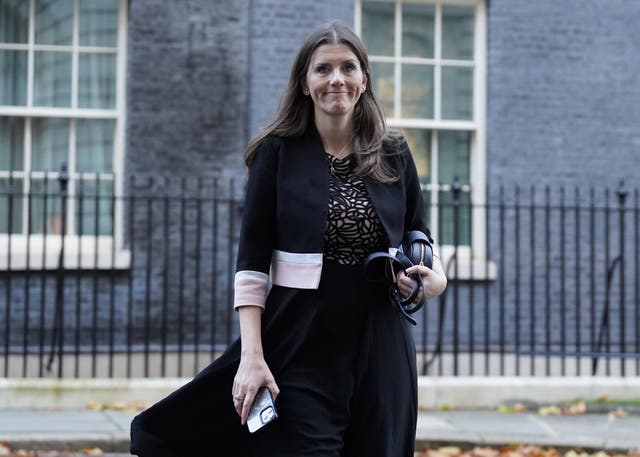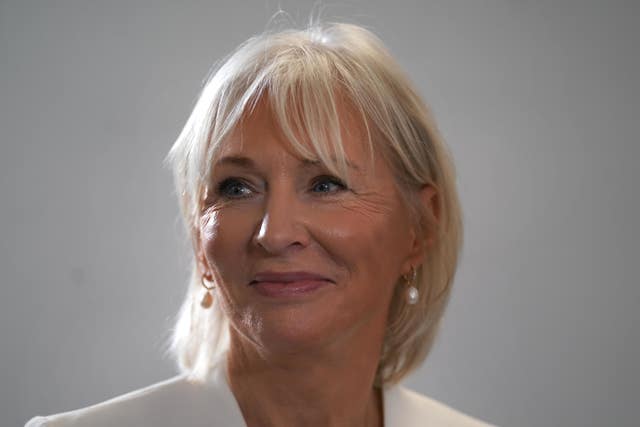
Nick Abbot 10pm - 1am
29 November 2022, 14:45

The proposed laws have caused a split in the Conservative Party.
Culture Secretary Michelle Donelan has announced major changes to the Online Safety Bill ahead of its return to Parliament.
Much delayed and controversial in its approach, the aim of the Bill is to introduce major regulation to social media platforms for the first time.
Here is a closer look at the proposed internet safety laws.
– What is the Online Safety Bill?
Hailed as groundbreaking regulation of the tech sector, the central aim of the Bill is to introduce rules to social media and other user-generated content-based sites that compel them to remove illegal material from their platforms, with a particular emphasis on protecting children from seeing harmful content.
Firms that break these rules would face large fines from the sector’s new regulator, Ofcom.
NEWS: New measures added to the #OnlineSafetyBill
➡️ Stronger protections for children➡️ Tougher measures to protect women and girls➡️ New duties to boost free speech #safeonline | https://t.co/HifY9ucZD7 pic.twitter.com/PsZr4eB2oO
— Department for Digital, Culture, Media and Sport (@DCMS) November 29, 2022
– Why has it been controversial?
The Bill has been at the centre of a debate over free speech, censorship, and the necessity to police harmful content on the internet.
This has focused on the so-called “legal but harmful” duties that were in the Bill, which would have required the biggest platforms to ensure their users, and in particular children, are not exposed to harmful content, even if it was not illegal.
Some politicians and online safety campaigners have repeatedly called for more to be done to protect children from the swathes of harmful content online – including having the Online Safety Bill go further.
But on the other side, some MPs – including a number of senior Tories – and free speech campaigners have warned the Bill could be used as a tool for online censorship, incentivising or even forcing sites to take down legal speech simply because it offends some people.
This debate, along with changes of government and multiple changes of culture secretary, has meant the Bill has been in the pipeline for more than five years and has already been through several different versions, to much frustration on all sides.

– What has been changed now?
In an attempt to balance the free speech debate, the current Culture Secretary has now announced a refining of the Bill, with the legal but harmful duties removed.
Instead, alongside the existing measures that require social media firms to remove all illegal content from their sites, the Bill will compel firms to give users tools to filter out potentially harmful but legal content they do not want to see.
Strong protections remain in place for children, with sites required to show how they enforce age limits, publish summaries of risk assessments in regard to potential harm to children on their sites, and declare details of enforcement action taken against them by Ofcom.
But critics, including some in her own party, have accused the Culture Secretary of “watering down” the Bill – something she has denied.
– Why are Tories so split on the Bill?
Measures to more strictly police what happens online have inevitably sent alarm bells ringing among free speech advocates in the Conservative Party, who have expressed concerns the new legislation could amount to censorship.
But others feel the original provisions written into the Bill were necessary to keep people safe in an increasingly virtual world.

Some Tories, including former Cabinet ministers David Davis and Lord Frost, had baulked at plans to bring in new duties for social media giants to remove “legal but harmful” content for adults from their sites – citing fears over how such material would be defined.
International Trade Secretary Kemi Badenoch also previously warned that the Government should not be “legislating for hurt feelings”.
But removing the legal but harmful duties will prove unpopular with former culture secretary Nadine Dorries, who spearheaded the legislation in its original form and previously accused Ms Donelan of failing to grip the issues at hand.
Ms Dorries told The House magazine: “There is absolutely no reason whatsoever why the Bill needs to be altered in any way.
“Michelle has been in the job five minutes and does not understand enough about it.”

– How long will it take to get the Bill through Parliament?
Ms Donelan has pledged the Online Safety Bill will become law “during this parliamentary session” – which is due to end in the spring.
Given the legislation has already been carried over once, it is on track to fall by that point if it does not pass all of the necessary hurdles.
The Culture Secretary said the Government must work at “maximum speed” to get the legislation through Parliament.
“We’ll bring the Bill back to the House of Commons next Monday and it will become a law during this parliamentary session,” she told LBC on Tuesday.
She said there will “obviously” be an implementation period because Ofcom will have to produce “comprehensive guidance and codes of practice” to make the legislation “workable”.
But she stressed the importance of getting things “right”, adding: “We don’t want this to end up being a Bill that is implemented incorrectly.”
Former Tory culture minister Dame Caroline Dinenage warned the Bill has “very little time left”.
“This Bill will effectively time out before we get to the end of this session of Parliament, which will probably be in the spring,” she told BBC Radio 4’s World at One programme.
“With it will fall every single one of the protections which so many people have worked and fought so long and so hard for over such a long time.
“We can’t risk that at all.”